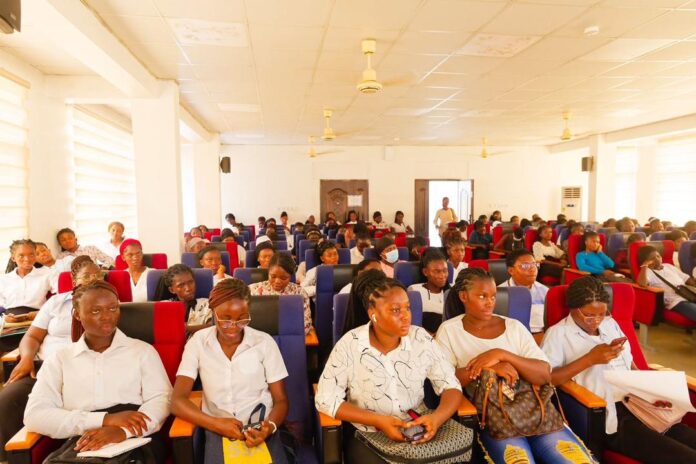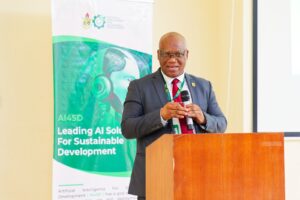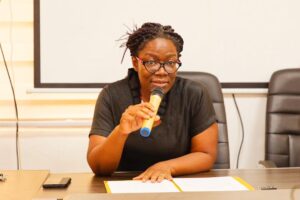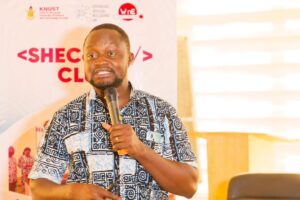The Artificial Intelligence for Sustainable Development (AI4SD) SHECodes program has been launched at Kumasi Technical University (KsTU) to empower females.
The initiative, funded by the French Embassy in Ghana, seeks to equip female students with the skills necessary for careers in Artificial Intelligence (AI), Science, Technology, Engineering, and Mathematics (STEM).
The project, rolled out in partnership with KsTU Women in Engineering (WinE), led by Miss. Antoinette Yeboah Oppong, targets female students from various departments at the Kumasi Technical University (KsTU), providing them with coding training in AI and other STEM fields.
An introduction of the AI4SD project presented on behalf of the project lead Prof. Jerry John Kponyo, reiterated the value of the SHECodes initiative.
Dr. Eunice Akyereko Adjei, the team lead for AI in Education, encouraged students to prepare for emerging jobs in the digital space and to develop skills that will help them adapt to changing roles.
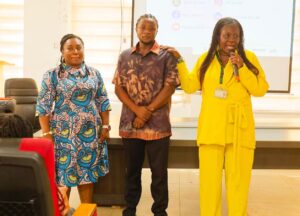
“The digital space is rapidly evolving, and it’s crucial that students, especially women, equip themselves with the necessary skills to thrive in emerging jobs.
We believe women are inherently creative, and we want to ensure that they are not limited by outdated norms.
Initiatives like SHECodes help to bridge the gender gap and open up new opportunities for women in technology,” she said.
The team lead for AI in Education, revealed the challenges women face due to stereotypes in male-dominated fields.
She noted that the AI4SD project in education will address and change these biases, promoting a more inclusive environment for women in technology.
“We want to break stereotypes faced by women in male-dominated fields, and we’re ready to help women sharpen their skills,” she said.
The project will inspire students to use their knowledge to address developmental challenges in Ghana and beyond.
“When we give students skills training for a specific program, we’ll give them a challenge, and they’re required to use the skills they acquire from the training to solve them.
We expect to see prototypes from most of these students because many of them are offering engineering courses,” she added.
The key trainers for SHECodes KsTU chapter Dr. Mrs. Martina Fransica Baidu and Mr. Musah Ibrahim Ali were introduced to the members during the launch.
Dr. Kingsford Sarkodie Obeng Kwakye, a member of AI in education under the AI4SD project, introduced the students to machine learning, popular machine learning frameworks, and ethical issues in machine learning.
He, however, called for more collaboration to ensure the success of similar projects.
“Machine learning is transforming education, there should be more collaboration with stakeholders for its success,” he advised.
The Artificial Intelligence for Sustainable Development (AI4SD) SHECodes training will officially commence on the 8th of February at KsTU.
Prof. Abena Agyeiwaa Obiri-Yeboah, Pro Vice Chancellor of Kumasi Technical University (KsTU), reaffirmed the university’s commitment to inclusive education during the event.
She emphasized that, “the AI4SD project in education aligns with the university’s vision”.
The Pro Vice Chancellor encouraged students to take full advantage of the coding opportunities provided in the training.
Prof. Robert Dery Nagre, Dean of the Faculty of Engineering and Technology at KsTU, stressed on the need to include Artificial Intelligence (AI) in the institution’s engineering curriculum.
“AI is shaping the world on a daily basis, cutting across every field. It’s time we embrace it fully
AI is not included as part of the core courses in the engineering curriculum at KsTU.
However, last year, efforts were made to make AI a compulsory subject for all engineering students.
While the initiative was not fully implemented, the university plans to include AI in the curriculum in the next revision of its programs,” he revealed.

